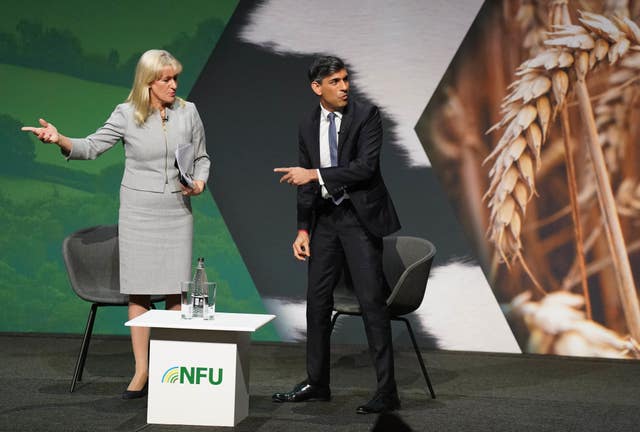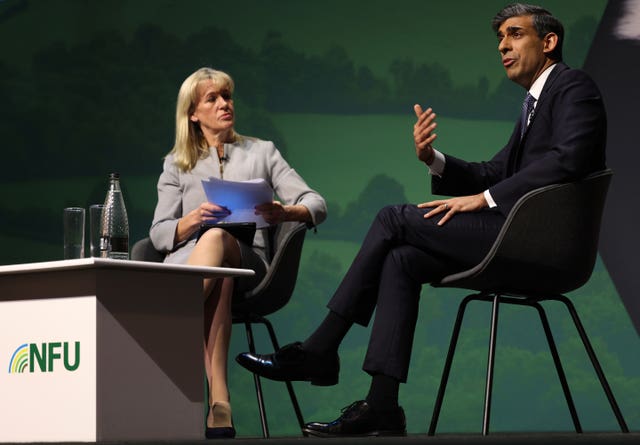Food security ‘vital part of national security’, Sunak tells farmers
Prime Minister heaps praise on farmers in the wake of polling which showed Labour narrowly beating Tories in rural areas.

Rishi Sunak has told farmers that food security is a vital part of national security as he set out support for the sector.
Speaking at the National Farmers’ Union (NFU) annual conference, the Prime Minister outlined a doubling of the amount going to technology and innovation schemes such as robotics, roof-top solar and agricultural research, to £220 million, helping farmers to increase productivity.
The money is part of the Government’s commitment to maintain support for English farming at pre-Brexit levels of £2.4 billion a year.
In the first speech by a Prime Minister to the NFU conference since 2008, ahead of an expected general election this year, Mr Sunak also outlined plans to reduce “red tape” to allow farmers to develop on-farm businesses such as shops.
The speech comes in the wake of polling which found Labour had narrowly overtaken the Tories among countryside voters, who also felt neither main party understood rural communities.
Mr Sunak heaped praise on British farmers, saying: “We’re strengthening support for your primary role to produce the nation’s food security as a vital part of our national security.
“And recent years have brought home the truth of that. Putin set off not just an energy price bomb, but a food price bomb too.
“You help support millions of jobs, add billions to our economy, shape the landscape.

“But most of all, you produce the food we need – food that is some of the best and highest quality anywhere in the world.
“And that’s why I say to all of you and to Britain’s farmers, just as I did, in my very first speech in Parliament: I’ve got your back.”
Mr Sunak defended the move away from the EU-era Common Agricultural Policy (CAP), with payments focused on the area of land farmed, saying it did “little for food productivity or the environment. It was far, far too bureaucratic.
“So, we’re changing the culture. That means trust, support, co-operation. That means delivering on our promise to cut planning red tape that’s stopping you from diversifying,” Mr Sunak said.
He told farmers the Government had changed its approach to trade deals to support the sector, was making sure there was fairness in the supply chain, and had a “massive, new and welcome focus on food security and food production”.
The Prime Minister also said the Government will also publish an annual food security index, monitoring the UK’s current level of food security and how it can be maintained.
He added: “It is an incredible thing you do, you don’t do it for the money, for sure.
“But you do it because you love it. You do it because you feel a responsibility. You do it because it’s tradition and I’m enormously grateful to you for it. I think it’s a very special part of our country.”
But speaking to journalists after the speeches, National Farmers’ Union president Minette Batters said farmers ran businesses and needed to be profitable.
“For too long, politicians have seen farming as a sort of cottage industry.
“And actually what the Prime Minister said today about ‘we know you do it for the love of it’. These are businesses, they don’t do it for the love of it.
“Yes, they love it – otherwise, they wouldn’t be doing it.
“But they are businesses and we need to have profitable agriculture,” she said, if legislative targets to look after the environment were to be met.
Earlier, in her speech to the conference, Ms Batters outlined the challenges facing the sector, including extreme weather and flooding, soaring input costs due to Russia’s war on Ukraine, and the move away from EU-era subsidies to environmental land management schemes paying for public goods.

She attacked the Welsh Government for its sustainable farming scheme, which would cut jobs, livestock numbers and farm incomes, warning the programme was a “red line, and we will not cross it”.
Food production was becoming the “poor relation”, Ms Batters warned, and said: “At the general election I’d like all parties committed to treating food security as the same strategic priority as energy security.”
She called for a mid-term review to monitor the impact of England’s new sustainable farming incentive – which pays farmers for measures including boosting soil health, protecting waterways and preserving hedgerows.
“We must see changes this year to redress the imbalance between environment and food production in Government policy before many more farms just simply disappear.”
Ms Batters warned of a “ill-informed utopia where we live on lab-grown meat and gloop produced in factories”, which she described as a “joyless dystopian vision” that could never replace nutrient-rich food grown in the landscape.





